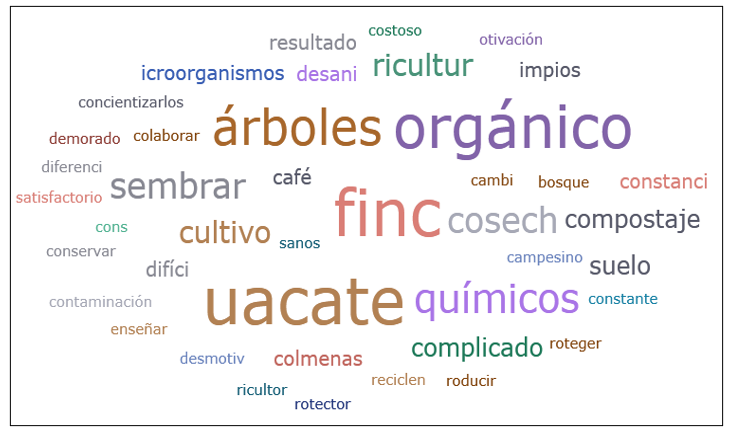Social perceptions of the agroecological transition process in coffee-growing families of Guadalupe, Huila
Main Article Content
Abstract
The context of the research is the coffee monoculture in Huila and its point of analysis is those Laboyana peasant families that carry out these agroecological transition processes. The objective of the research was to analyze the social perceptions that coffee-growing peasant families from a rural community in the department of Huila in Colombia have about their agroecological transition process from conventional coffee cultivation to a crop with agroecological principles. The methodology used is a qualitative and ethnographic approach, a case study in the Los Cauchos village, in the Municipality of Guadalupe, where coffee-growing families were interviewed about their perception of the agroecological transition process. The interviews were recorded, transcribed, categorized and the findings were written up. As part of the results, it was found that for coffee-growing households, four determining components in the agroecological transition process of their agroecosystem are: 1) technical-productive, 2) economic, 3) socio-humanistic, and 4) practical knowledge, linking care, effort, dedication, patience, support networks, stigmatization and frustration as significant concepts to understand their agroecological process. By way of conclusions, there is that locally there is a struggle between two conceptions of agriculture, one naturalized and with an entire institutional and market apparatus, and another initial one that opens spaces for a better location within the market and with greater incidence in the administrative sphere. and social relations in Guadalupe, Huila.
Downloads
Article Details

This work is licensed under a Creative Commons Attribution-NonCommercial 4.0 International License.
References
ALTIERI, M.A., 1992. ¿Por qué estudiar la agricultura tradicional? La tierra, mitos, ritos y realidades: coloquio Internacional. Granada, 15-18 de abril de 1991, 1992, ISBN 84-7658-365-6, págs. 332-350 [en línea]. S.l.: Anthropos, pp. 332-350. [consulta: 24 diciembre 2023]. ISBN 978-84-7658-365-4. Disponible en: https://dialnet.unirioja.es/servlet/articulo?codigo=560642.
ALTIERI, M.A. y YURJEVIC, A., 1992. La agroecología y el desarrollo rural sostenible en América Latina. AMBIEN-TICO [en línea], no. 22, [consulta: 24 diciembre 2023]. Disponible en: https://www.ambientico.una.ac.cr/wp-content/uploads/tainacan-items/5/1578/22_2-12.pdf.
BONILLA-CASTRO, E. y SEHK, P.R., 1997. Más allá del dilema de los métodos: la investigación en ciencias sociales [en línea]. S.l.: Ediciones Uniandes. ISBN 978-958-9057-72-8. Disponible en: https://books.google.com.cu/books/about/M%C3%A1s_all%C3%A1_del_dilema_de_los_m%C3%A9todos.html?hl=es&id=oSa54vNsC7YC&redir_esc=y.
CADENA DURÁN, O.L., 2009. Aportes conceptuales para un análisis de la producción orgánica, elemento transformador de la nueva ruralidad. Biotecnología en el Sector Agropecuario y Agroindustrial: BSAA [en línea], vol. 7, no. 2 (julio a diciembre), [consulta: 22 septiembre 2023]. ISSN 1909-9959, 1692-3561. Disponible en: https://dialnet.unirioja.es/servlet/articulo?codigo=6117988.
CARRILLO, E.L.H., 2022. Aspectos clave en agroproyectos con enfoque comercial: Una aproximación desde las concepciones epistemológicas sobre el problema rural agrario en Colombia. Región Científica [en línea], vol. 1, no. 1, [consulta: 24 diciembre 2023]. ISSN 2954-6168. DOI 10.58763/rc20224. Disponible en: https://rc.cienciasas.org/index.php/rc/article/view/4.
GARCÍA, T., R. 2000. La Agroecología: ciencia, enfoque y plataforma para su desarrollo rural sostenible y humano. Revista "AGROECOLOGIA".
GLIESSMAN, S.R., 2002. Agroecología: procesos ecológicos en agricultura sostenible [en línea]. S.l.: CATIE. ISBN 978-9977-57-385-4. Disponible en: https://biowit.files.wordpress.com/2010/11/agroecologia-procesos-ecolc3b3gicos-en-agricultura-sostenible-stephen-r-gliessman.pdf.
MARTÍNEZ, J., 2020. La interseccionalidad como herramienta analítica para la praxis crítica del Trabajo Social. Reflexiones en torno a la soledad no deseada. Cuadernos de Trabajo Social [en línea], vol. 33, no. 2, [consulta: 22 septiembre 2023]. ISSN 1988-8295. DOI 10.5209/cuts.65181. Disponible en: https://revistas.ucm.es/index.php/CUTS/article/view/65181.
MIRANDA HERNÁNDEZ, Y., SÁNCHEZ GONZÁLEZ, A., MACHADO SUÁREZ, L. Y., & RODRÍGUEZ VILLAMIL, L. N. 2019. Significados y usos que los habitantes de una vereda en Chigorodó, Antioquia, Colombia, dan a los alimentos que producen. Perspectivas En Nutrición Humana, vol 21 no. 2, pp. 173-187. https://doi.org/10.17533/udea.penh.v21n2a04
OSPINA, D.T., 2021. Las economías campesinas en Colombia. Tensiones y desafíos. Algarrobo-MEL [en línea], vol. 10, [consulta: 22 septiembre 2023]. ISSN 2344-9179. Disponible en: https://revistas.uncu.edu.ar/ojs3/index.php/mel/article/view/5312.
ROJAS, Y.L., 2017. Mercados orgánicos: propuesta de seguridad alimentaria y desarrollo rural. El caso de la Asociación Red Agroecológica Campesina en Subachoque, Cundinamarca. [Proyecto de investigación, Universidad Nacional Abierta y a Distancia UNAD]. [en línea]. S.l.: Repositorio Institucional UNAD. Disponible en: https://repository.unad.edu.co/handle/10596/13648.
SEVILLA GUZMÁN, E., 1998. EL Marco Teórico de la Agroecología. En Materiales de Trabajo del Curso "Agroecología y Conocimiento Local". Universidad La Rábida, del 16 al 20 enero, p.3-28.


